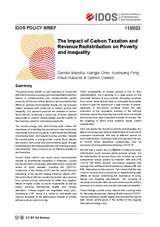Policy Brief
The impact of carbon taxation and revenue redistribution on poverty and inequality
Malerba, Daniele / Xiangjie Chen / Kuishuang Feng / Klaus Hubacek / Yannick OswaldPolicy Brief (11/2022)
Bonn: German Institute of Development and Sustainability (IDOS)
DOI: https://doi.org/10.23661/ipb11.2022
The global policy debate on just transitions is concerned with how to achieve a socially just and acceptable transition toward a climate-neutral and climate-resilient global economy. At the core of this debate is the assumption that efforts to combat environmental threats will not succeed unless combined with measures to reduce poverty and inequality. Our research explores the potential of carbon fiscal reforms, combining a carbon tax of levels deemed appropriate to achieve climate targets and the transfer of the revenues raised to vulnerable households.
The current energy and cost-of-living crisis shows the importance of protecting the poorest and most vulnerable households from price increases. It also shows the difficulty of achieving short- and long-term policy priorities. Despite the current spikes in energy prices, carbon fiscal reforms can achieve both social and environmental goals through simultaneously decreasing emissions and reducing poverty and inequality. They should act as an effective enabler of just transitions.
Carbon fiscal reform can avoid some environmental impacts by incentivising reductions in emissions. Carbon pricing has been increasingly advocated and is now at the centre of policy debates, including the UNFCCC Conference of the Parties (COP) and the recent German presidency of the world’s leading industrial nations (G7). But carbon fiscal reforms can also be used to raise revenue from carbon pricing instruments to offset the negative effects of higher prices on poorer households as well as further reaching distributional targets and poverty alleviation. Climate targets are negotiated every year, including at COP, hence it is critical to re-evaluate and improve estimates of the distributional impacts of climate policies such as carbon pricing.
Public acceptability of climate policies is key to their implementation, but it depends to a large extent on the perceived fairness of such policies. Recycling revenues from carbon taxes directly back to vulnerable households is likely to gain the approval of a large number of people, especially in low-income countries where the high proportion of the population involved in the informal economy means that lowering income tax does not benefit the poorest and most vulnerable sections of society. But the targeting of these direct transfers needs careful consideration.
Here, we assess the impact on poverty and inequality of a global carbon tax and national redistribution of revenues to vulnerable households. We look at different options for such redistribution, including a lump sum payment, the use of current social assistance programmes, and an expansion of social assistance following COVID-19.
We find that a carbon tax of US$50/tCO2 without revenue redistribution could increase global extreme poverty, but the redistribution of revenue from such a carbon tax could substantially reduce poverty by between 16% and 27% (110 to 190 million people), and reduce inequality (the average Gini coefficient would decline by between 4% and 8%), depending on the scenario. This shows that the way in which revenue from a carbon tax is redistributed greatly affects its impact, underlining the importance of policy design and targeting mechanisms. The recycling of revenues should also take into account the specific political economy of a country and consider international transfers.
These findings provide policy makers with a strong basis for informing discussions, starting off with those at COP27, in which ambitious climate targets and just transition should both remain central goals in the context of the ongoing international energy crisis.
Contact
Cornelia Hornschild
Publication Coordinator
E-mail Cornelia.Hornschild@idos-research.de
Phone +49 (0)228 94927-135
Fax +49 (0)228 94927-130
Alexandra Fante
Librarian/ Open Access Coordinator
E-Mail Alexandra.Fante@idos-research.de
Telefon +49 (0)228 94927-321
Fax +49 (0)228 94927-130




![[Translate to English:] Photo: Alexandra Fante, Bibliothekarin/Open Access-Koordinatorin](/fileadmin/_processed_/f/0/csm__c_Deutsches-Institut-fuer-Entwicklungspolitik_Fante_94ce4fa1ba.jpg)